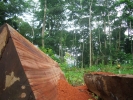 A recent report released by the Environmental Investigation Agency (EIA) after three-year investigation, highlighted the Senegal-Gambia-China rosewood traffic and uncovered unprecedented evidence on a series of major forest crimes. According to the report, around 1.6 million rosewood trees were illegally logged in the Casamance province of Senegal and smuggled to Gambia to China between June 2012 and April 2020, to be re-exported to China.
A recent report released by the Environmental Investigation Agency (EIA) after three-year investigation, highlighted the Senegal-Gambia-China rosewood traffic and uncovered unprecedented evidence on a series of major forest crimes. According to the report, around 1.6 million rosewood trees were illegally logged in the Casamance province of Senegal and smuggled to Gambia to China between June 2012 and April 2020, to be re-exported to China. The rosewood traffic between Senegal and The Gambia has been largely controlled by the armed rebel group Movement of Democratic Forces of Casamance (Mouvement des forces démocratiques de Casamance – MFDC in French) and is the principal source of income for the rebels.
This trade undermined the export ban put in place by the current Gambian president, Adama Barroe. Things seems to be more complicated, as the traffickers used the parastatal company Jagne Narr Procurement & Agency Services (“Jagne Narr”) to bypass the ban.
The Senegal-Gambia-China rosewood trade has flourished in violation of the Convention on International Trade in Endangered Species of Wild Fauna and Flora (CITES). The Gambia is a small, narrow West African country surrounding the Gambia River and itself surrounded on three sides by Senegal. Despite logging its own rosewood to extinction years ago, the Gambia has become a major trading hub for rosewood and was China’s third-largest source of hongmu in 2019, with The Gambia reporting US$471million less in exports than its trading partners declared as imports between 2010 and 2018.
Between February 2017, when the Gambia suspended rosewood exports, and April 2020, China imported 329,351 tons of rosewood from the Gambia. This is more than China imported in 2015 and 2016 (241,254 tons), when the Gambia was still ruled by Jammeh. The former dictator, who has tribal connections with the Casamance, established rosewood trafficking as his fiefdom, reportedly making millions of dollars in exports through a parastatal company in Banjul, the capital.
Previous EIA investigations revealed how trafficking of protected rosewood in West Africa’s dry forests has become the largest in the world, supplying China’s rapacious billion-dollar market for hongmu, a type of rosewood used for traditional-style furniture.
The illegal trade of rosewood flourished around the Casamance secession conflict. Thousands of people have been killed during fighting between the rebels and the army and many more displaced. Rosewood trafficking has thrived in this environment of fear and secrecy, among communities that have been divided by the conflict.
Illegal logging took hold around 2010 in rebel-held forests in Ziguinchor district on the transit route to the Gambia. Although a fragile cease-fire has been in place since 2014, it remains difficult for the Senegalese authorities to enter the border areas because of landmines and the presence of rebels.


